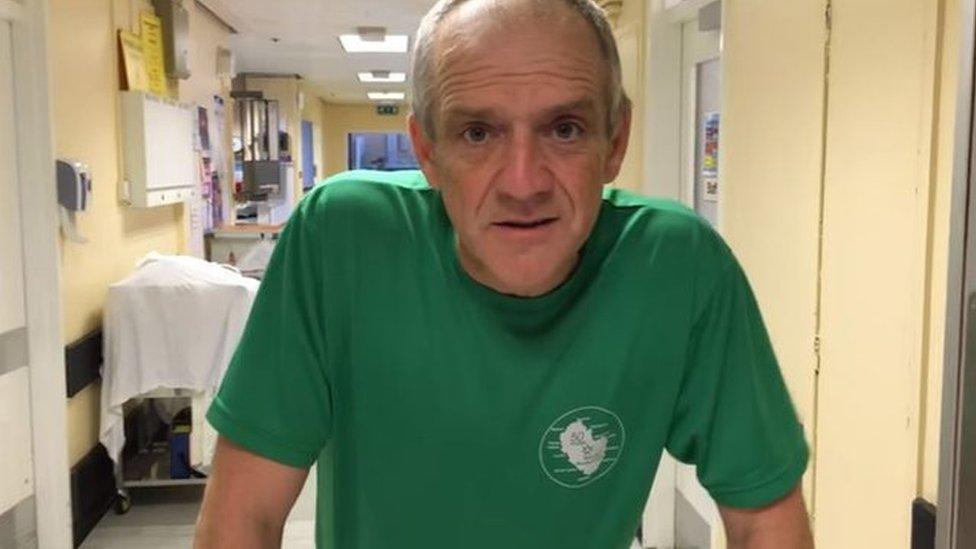Cardiff runner Rory Coleman gears up for 1,000th marathon
- Published
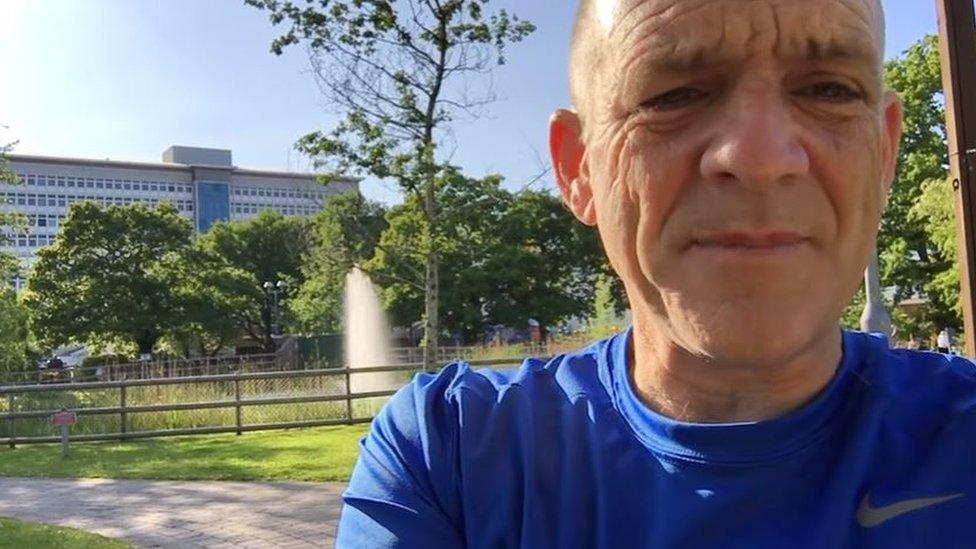
Rory Coleman in the grounds of the University Hospital of Wales
A runner who feared he would never walk again after being struck down by a rare virus is to take part in his 1,000th marathon.
Rory Coleman, 55, from Cardiff, will line up for the Nottingham Robin Hood Marathon on Sunday.
It comes just 18 months after he contracted Guillain-Barré Syndrome,, external which left him in a wheelchair.
But after two months in hospital and four weeks in a rehabilitation unit, he fought his way back to fitness.
He said joining the exclusive club of 1,000 marathon runners would be a big moment for him.
"I think it's going to be an emotional day on Sunday, my wife's running with me, my daughter's running her first marathon," he said
"I was stuck on 976 marathons for a long time, I've done 23 in the last year, but actually they're all important. It's not about the 1,000th it's about the 999 that have led up to it."
In addition to his marathons, Mr Coleman has also run 244 ultra marathons and has completed the famously tough Marathon des Sables, a 156-mile race through the Moroccan desert, 14 times.
Just weeks after completing the Marathon des Sables in 2016, Mr Coleman started to feel unwell and he was diagnosed with Guillain-Barre Syndrome, Syndrome (GBS), an autoimmune neurological disorder which can cause numbness, muscle weakness and co-ordination problems.
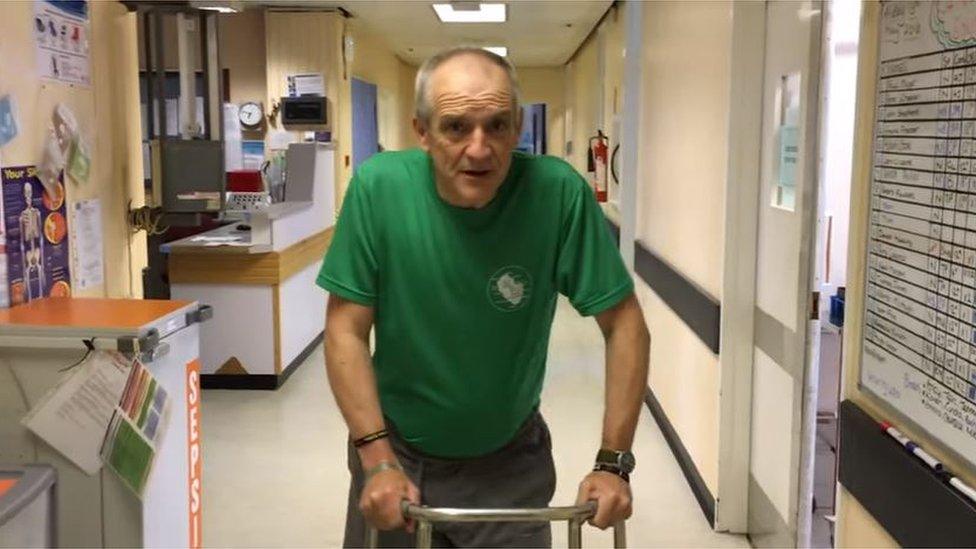
Rory Coleman had to learn how to walk again
Within days, he went from being an extraordinarily fit man to someone who was almost completely paralysed - for a time his family were not sure if he would live or die.
"I really didn't know what to think," he recalled.
"I was frightened, scared, I was completely in denial and I literally didn't know what to do."
For a man who had never suffered an injury during his 23-year running career, finding himself in the University Hospital of Wales in Cardiff, forced to rely on doctors and nurses for even the most basic needs, was a bitter blow.
"It felt very difficult indeed. I'm someone who doesn't need any help from anybody and I had to accept where I was and actually ask people for help which was completely unheard of at the time," he said.
"Hospital is a very harsh environment, you're in there with lots of other people with lots of other illnesses and you're trying to get well at the same time."
'Just horrendous'
The diagnosis could not have come at a worse time for the Coleman family.
At home his wife Jen - who is also an ultra marathon runner - was six months pregnant with the couple's second child together, Charlie.
She said: "Fitness is everything to both of us. To see him both potentially not ever be able to run again coupled with having to rely on other people for help with absolutely everything was just horrendous for all of us really."
Unable to walk, Mr Coleman found himself relying on a wheelchair. But even then, ill as he was, it was clear that he was determined to fight GBS.
"I think the most important part of the journey was learning to stand," he said.
"I worked out that if I could stand up, then I could walk and I planned everything meticulously to happen on a Friday and I remember those first four steps between the parallel bars, letting go and thinking 'hallelujah, I've reached the promised land'."
It was a huge milestone, for him and his family.
As the weeks went on he swapped the wheelchair for a walking frame.
The anonymous corridors of the hospital became as challenging as the toughest marathon course for Mr Coleman as he slowly made his way along their length, coaxing his legs to move forwards.
He was transferred to the city's Rookwood Hospital for intensive rehabilitation. Under the watchful eye of the physiotherapists, the walking frame was replaced by crutches and eventually Mr Coleman stood and walked again.
But simply being able to walk again was not enough. He wanted, and needed, to run.
He began with his local Parkrun in Cardiff's Bute Park.

Rory Coleman said he was proud to finish last year's Cardiff Half Marathon with his wife Jen
Mr Coleman was the last runner to complete the popular 5km course, but he was back, cheered to the finish by friends and fellow runners.
And a year after falling ill he was back in the Sahara Desert, tackling his 14th Marathon des Sables. He admitted he was slower than before and "still a bit wobbly," but he had faced the race and completed it.
He said one of his proudest moments was completing one of his shortest races, the Cardiff Half Marathon last year, with his wife running by his side.
"To run that race, in my home city, was amazing," he added.
First race
What is perhaps most surprising is that Mr Coleman was a latecomer to running.
He was a 15 stone, 40-a-day smoker and drinker when he decided it was time to change his life.
He completed his first run in jeans, a jacket and a pair of leather shoes in January 1994. It was less than 100m, but it was a start.
He gave up drinking and smoking and concentrated on running. And it came naturally to him.
In three months he ran his first half marathon. Just ten months after that very first run he completed his first marathon in Telford, Shropshire, and until his illness he had run a marathon every week since.
He became a coach and trainer - in the 2015 Marathon des Sables, he guided the veteran explorer Sir Ranulph Fiennes across the sands, while he also helped former Blue Peter presenter Helen Skelton to run the gruelling 78-mile Namibia Ultra Marathon.
So, after he completes his 1,000th marathon, what will be next for Rory Coleman?
"Maybe I'm going for speed, one of the things with GBS is that literally it slows your whole body down, I've got some new personal bests to get under my belt."
- Published12 September 2016
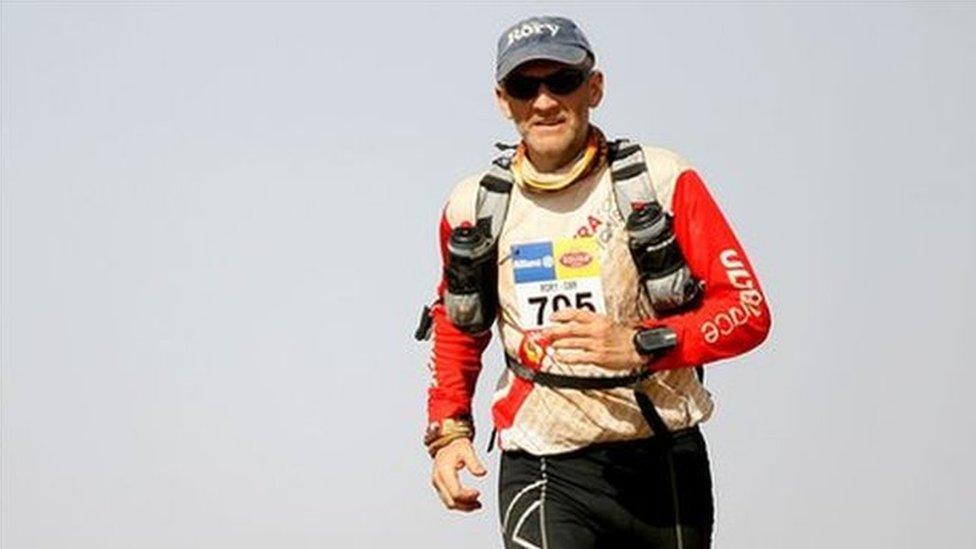
- Published29 May 2016
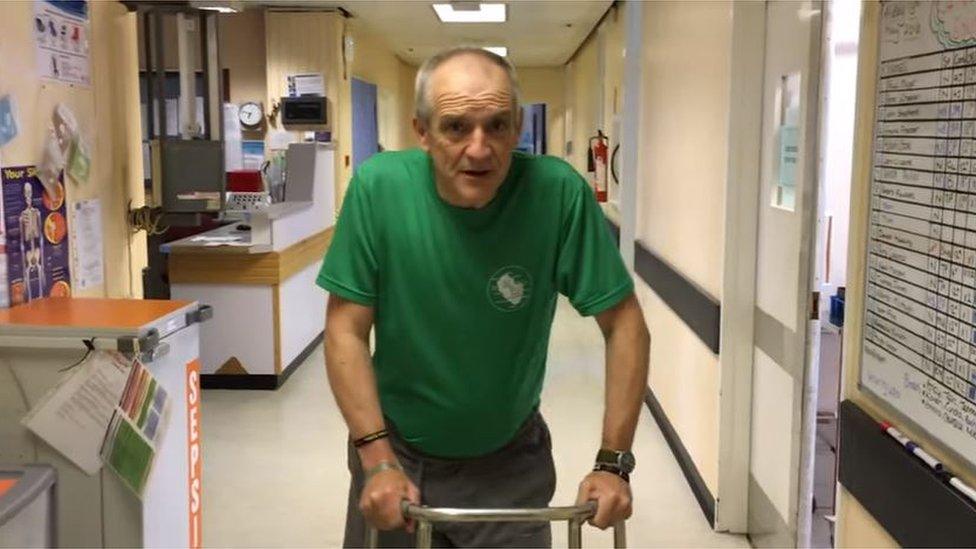
- Published5 October 2013
.jpg)
- Published29 May 2016
